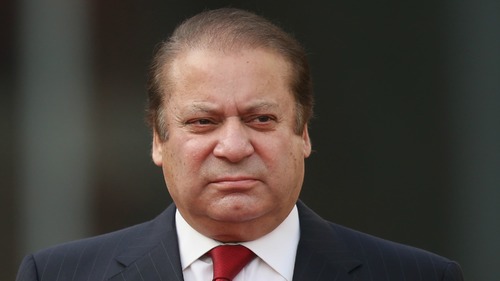The Chief Justice of Pakistan (CJP) Mian Saqib Nisar on Friday observed that the court was not limiting its review of the Elections Act 2017 to Nawaz Sharif alone, and had to look at the bigger picture to ascertain its implications.
The remark was made while a three-member Supreme Court (SC) bench headed by Justice Nisar heard arguments from multiple petitioners, including Advocate Zulfiqar Bhutta, the Justice and Democratic Party (JDP) and lawmaker Jamshed Dasti among others.
The counsel for JDP, Sheikh Ahsanuddin, claimed that the amended Elections Act was only passed to pave the way for Nawaz to retake his position as PML-N chief, even though the Constitution does not allow a disqualified person to head a political party.
Advocate Bhutta also adopted the arguments presented by MNA Sheikh Rashid's lawyer, Barrister Farogh Naseem, and PPP's counsel, Latif Khosa, in previous hearings. He added that there was no way a person disqualified by the apex court could become a political party chief.
To this, the CJP reminded him that the new law passed by Parliament could allow any convicted person to assume the position of political party head.
On Feb 6, Naseem had similarly argued that the Elections Act 2017 was passed only 17 days after Nawaz's disqualification, which indicated its mala fide intent.
When the CJP asked how the appointment of a disqualified person as party chief contradicts the Constitution, he had said that according to Article 63-A of the Constitution, important powers were vested in the office of party chief, including the disqualification of a legislator belonging to their party.
"The party chief can [thus] also influence legislation and the election of a prime minister [by exercising that power]," Naseem had argued.
Khosa, in his arguments on Feb 7, had raised similar questions over the timing of the passage of the Elections Act 2017, terming it "suspicious". He said that the Act negated Article 62 (1)(f) of the Constitution and the court had the authority to protect it.
In today's hearing, Justice Nisar said that the apex court can only nullify a law if it contradicts the Constitution. He also pointed out that a representative of the Election Commission of Pakistan was in the Standing Committee when the Elections Act 2017 was being drafted.
Dasti's lawyer, Azhar Siddiq, argued that any legislation passed by the National Assembly cannot undo Article 62 (1)(f) of the Constitution. He further stressed that a political party chief "can influence millions of voters."
The hearing has been adjourned to February 13.













































